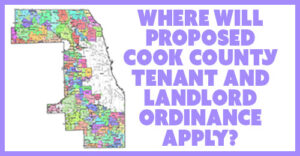 On July 30, 2020, I reported here that Cook County was proposing a County-wide tenant and landlord ordinance. (Note that the County ordinance puts the word tenant before landlord, so the County will have a RTLO while the City of Chicago will have an RLTO) Since then, I’ve been asked by a few landlords about where this law would apply. That’s a surprisingly complex issue, but let’s take a look.
On July 30, 2020, I reported here that Cook County was proposing a County-wide tenant and landlord ordinance. (Note that the County ordinance puts the word tenant before landlord, so the County will have a RTLO while the City of Chicago will have an RLTO) Since then, I’ve been asked by a few landlords about where this law would apply. That’s a surprisingly complex issue, but let’s take a look.
First, we need to talk about a concept known as “Home Rule”. The Concept of Home Rule is established by the Illinois Constitution Article VII Section 6. The Illinois Municipal League indicates that:
The purpose of home rule is to allow for local solutions to local issues and problems. A municipality with home rule status can exercise any power and perform any function unless it is specifically prohibited from doing so by state law.
In contrast, a non-home rule municipality may only exercise powers for which express authority is provided by state law. This means that non-home rule communities are dependent on obtaining grants of authority from the General Assembly and Governor. – Illinois Municipal League
To be a Home Rule municipality, a government body must either be (1) a County which has a chief executive officer elected by the electors of the county; (2) any municipality which has a population of more than 25,000; or (3) a municipality may elect by referendum to become a home rule unit. Currently, there are 217 Home Rule municipalities in Illinois.
So, why does this matter? Because many home rule municipalities like Chicago, Evanston, and Oak Park have landlord tenant ordinances. What happens when there is a Cook County ordinance and a Chicago Ordinance? The Illinois Constitution (Article VII Section 6 Subsection (c)) clears that up for us:
![]()
So the Chicago RLTO will take precedence over the Cook County RTLO. For any unincorporated areas of Cook County, any non-home rule municipalities, and any home-rule municipalities that do not have a landlord-tenant ordinance, this law will apply.
Someone contacted me the other day and suggested that this law only applies to government housing. I disagree. The language of Article IV Section 42-80 provides in part (highlight added):
 My read is that the Cook County RTLO will apply to all dwelling units located in Cook County (with the local home rule municipal preemption excepted). The sentence after the highlighted portion merely confirm “specifically” that units under a subsidy are also subject to the law provided there is no conflict with their statutory or regulatory provisions (I assume this is a way to square State of Federal preemption issues).
My read is that the Cook County RTLO will apply to all dwelling units located in Cook County (with the local home rule municipal preemption excepted). The sentence after the highlighted portion merely confirm “specifically” that units under a subsidy are also subject to the law provided there is no conflict with their statutory or regulatory provisions (I assume this is a way to square State of Federal preemption issues).
Bottom line? This law is a real threat to landlords in Cook County. Suburban landlords who do not want to become “the next Chicago” better get on the horn to their local County Commissioners. This law is set to come back in front of the board in September. And if something isn’t done by then, it might be too late.
